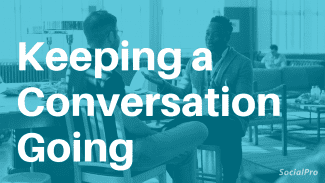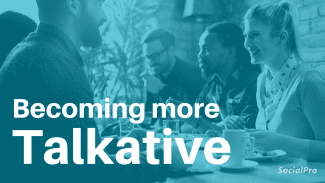“I have a bad habit of dominating conversations and talking over people. I do it with my friends, coworkers, and even my boss. How can I stop interrupting and become a better listener?”
Conversations may seem like a simple exchange of words, but all conversations actually have a complex structure with rules that need to be followed.[1][2] One of the most basic rules of conversation is that one person speaks at a time.[3]
When this rule is broken by a person who interrupts, cuts someone off, or talks over them, it can cause the person speaking to feel undermined or even offended.[2] Interrupting less improves the flow of a conversation and ensures that each person feels heard and respected.
In this article, you will learn more about interrupting, what drives it, and how to break this bad habit.
Turn-taking in conversations
When people talk over one another, finish each other’s sentences, or interrupt, conversations can become one-sided. People who interrupt a lot are often seen as rude or dominant in a conversation, which can lead others to become less open and honest.[2] Miscommunications become more likely to occur, and people have a harder time feeling close and connected to each other. For all of these reasons, following the one-at-a-time rule in conversations is the key to making sure a conversation is productive, respectful, and inclusive.[3]
Why and when people interrupt
While interrupting someone can make them feel offended, bad, and disrespected, this isn’t usually the intention of the person who is interrupting. Most of the time, people who interrupt a lot in conversations aren’t aware they’re doing it at the moment or don’t know how it is making other people feel.
Interruptions are more likely to occur in heated exchanges when you feel nervous, excited, or passionate about something you’re talking about or the person you’re talking to.[2] Here are some situations where you may be more likely to interrupt someone:
- When you feel nervous, insecure, or concerned about making a good impression
- When you are excited about a topic or conversation
- When you are under a lot of stress to make a good impression
- When you feel close and comfortable around someone or know them really well
- When you are distracted by something else
- When you have a lot of thoughts in your head you want to share
- When you feel a sense of urgency or there is limited time left to talk
If you have ADHD, you may be more easily distracted and more likely to interrupt people.
If you have a habit of interrupting people, you can break it with effort and consistent practice. Here are 10 ways to stop interrupting when someone is talking:
1. Slow down
If you have a tendency to speak fast, ramble, or feel a sense of urgency to say things, try slowing down the pace of the conversation. People are more likely to interrupt, overlap, or talk over each other during a conversation that feels rushed, and slowing down can also improve the flow of the conversation.[4]
Speaking slowly and taking more pauses can create a more comfortable pace during an interaction and gives each person more time to think before speaking. While silences that last several seconds can be uncomfortable, slowing down when speaking and allowing for brief pauses gives a chance for more natural turn-taking.[2][3]
2. Become a deep listener
Deep listening involves being fully present and attentive to another person who is talking instead of just hearing their words or waiting for your turn to talk. This skill can help you learn to enjoy conversations, even when you’re not the one talking.
By giving people your full attention when they speak, they also become more likely to offer you this same courtesy. In these ways, deep listening can make you a better communicator and can also lead to more meaningful and enjoyable conversations.[5]
Practice deep listening by using these simple strategies:[5]
- Focus fully on the other person
- Watch their non-verbal cues and body language
- Listen for the meaning behind their words
- Reflect back what you hear them say
- Make eye contact, nod, smile, and be more expressive
3. Resist urges to interrupt
When you are working on interrupting less, you may notice strong urges come up in certain conversations. Learning to notice these urges without acting on them is the key to breaking the habit. Pull back and bite your tongue when you have an urge to interrupt unless it’s absolutely necessary. The more you practice resisting these urges, the weaker they become, and the more you will feel in control of when you open your mouth in a conversation.
Here are some skills that can help you resist urges to interrupt:
- Notice the urge in your body and take slow, deep breaths until it passes
- Count slowly in your head to three or five before speaking
- Consider whether what you want to say is actually necessary, relevant, or helpful
4. Wait for a pause in conversation
The key to not interrupting is to avoid talking when someone else is speaking. Waiting for a pause or short silence is often the best way to avoid overlaps in a conversation.[2][3] In a more formal conversation or when talking in a group of people, it is sometimes necessary to wait for a transition point where it’s OK to chime in.
Here are some examples of natural pauses to look for in a conversation:
- Waiting until someone finishes telling a story
- Waiting until the end of a meeting to ask questions
- Waiting until someone finishes making a point
- Waiting to raise your hand until the end of a section in a training
- Waiting for a speaker to look at the group
5. Ask for a turn to talk
In some situations, you may need to ask for a turn to say something. Depending on the situation, there may be a formal way of asking for a turn or taking a turn, like raising your hand or asking to put an item on a meeting agenda beforehand.
In less formal social situations or groups, there may be more subtle ways of asking for the floor, including:
- Making eye contact with the speaker to let them know you have something to say
- Asking someone if they are OK with you making a comment or sharing an announcement
- Saying, “Do you have a second to chat or are you busy?” before launching into an in-depth conversation with a colleague or friend during work hours
6. Look for social cues
Learning to read nonverbal cues can help you know when to keep talking and when to stop talking in a conversation.
Some of the most common nonverbal cues to look for are listed in the table below. Keep in mind that getting cues to stop talking isn’t always personal and may just mean that you caught someone at a bad time or when they’re in the middle of something.
| Cues to keep talking | Cues to stop talking |
|---|---|
| The person makes good eye contact with you when you’re talking | The person looks down, at the door, at their phone, or away when you’re talking to them |
| Positive facial expressions, smiling, raised eyebrows, or nodding in agreement | Blank expressions, glazed over look in eyes, or seeming distracted |
| The person extends the topic with follow-up questions or comments | The person seems like they’re trying to conclude the conversation politely |
| There is a good back-and-forth, and you and the other person are both taking turns talking | You’ve done almost all of the talking, and they haven’t spoken much |
| Open body language, facing one another, leaning in, and being physically close | Body language is closed off, distant, restless, or pointed towards the door |
7. Make your words count
Talkative people may have trouble knowing when to stop talking and can unknowingly dominate a conversation, interrupt people, or talk over them. If you are naturally talkative or have a tendency to be long-winded, try to challenge yourself to communicate using fewer words.
Make each word count by setting a sentence or time limit for talking during a conversation. For example, make it a goal to not say more than 3 sentences without pausing, asking a question, or trying to include the other person in the conversation. Using fewer words will help to create more spaces in a conversation, allowing others to take turns talking.[2][3]
8. Write down key points
There are some situations where you feel like you need to interrupt so that you don’t forget something that’s important. For example, you might feel the urge to interrupt to share important information with colleagues during a work meeting or to highlight certain skills during a job interview.
In formal or high-stakes conversations, you can sometimes avoid needing to interrupt by jotting down key points you want to address beforehand. That way, you have a list of items you will remember to bring up but won’t feel pressured to do it at the wrong time (like when someone else is talking).
9. Encourage others to talk more
The best conversations strike a balance between speaking and listening. The ratio of how much you listen vs. how much you speak will vary depending on the situation, but being aware of this ratio is important. Pay attention to how much you are talking, and it feels like you’re talking too much, try to get the other person talking more.
Here are some natural ways to encourage people to open up and talk more in a conversation:
- Ask open-ended questions that can’t be answered in one word
- Hone in on topics the other person seems interested in
- Be warm and friendly towards the person to help them feel more comfortable around you
10. Stay on topic
An interesting study from Stanford University found that people who abruptly changed topics during a conversation were viewed as interrupting, even when they didn’t talk over anyone.[4] This means that people may believe you are interrupting if you are too quick to cut off a conversation, change the subject, or jump to a new topic. Avoid making other people feel like you are interrupting by changing a topic in a slow, gradual, and deliberate way.
11. Write down reminders
It can help to leave yourself reminders—for example, a sticky note on your monitor or a note on your phone’s lock screen—not to interrupt people. These reminders can help you stay on track when you’re trying to break the habit.
Not all interruptions are equal
There are many reasons why people interrupt during a conversation, and there are even some situations where interrupting is socially acceptable. For instance, interrupting a meeting to make an important announcement or update may be necessary to share information with the group.
People in leadership positions may need to interrupt more often to maintain order and keep the group organized and on-topic. Norms around turn-taking can also vary depending on a person’s culture, with some cultures regarding it as rude and others as normal or expected.[1][2]
Here are some situations where it may be appropriate or OK to interrupt someone in a conversation:[6]
- To share important information or updates
- When there is an urgent situation or emergency
- To guide or keep a conversation on topic
- Providing a turn or chance for quiet or excluded people to talk
- Confronting disrespectful or unacceptance behavior
- When you have not been given a chance to talk or give input at all
- After unsuccessfully trying polite ways to ask for a turn to talk
- When you need to end or close a conversation
Polite ways to interrupt
When you do need to interrupt someone, it’s important to do so tactfully. There are some ways of interrupting that are more likely to be seen as rude or aggressive, and other ways that are more subtle.
Here are some ideas of how to interrupt in a polite way:[6]
- Saying “excuse me…” before interrupting
- Raising your hand before you interrupt
- Cueing the speaker with a look, nod, or gesture beforehand
- Interrupting quickly by saying, “Just one quick thing…”
- Apologizing for interrupting and explaining why you need to
- Try not to make the interruption too abrupt
Final thoughts
Interrupting could be something you do unconsciously when you’re really nervous, excited, or upset about something, but it can be irritating to other people. When you do it too often, it can even lead people to wrongly assume you are pushy, arrogant, or domineering. By paying more attention during conversations, avoiding urges to interrupt, and working on improving your communication and social skills, you can break this bad habit and have better conversations.
Common questions
Here are answers to some of the most common questions people have about interrupting people in conversations.
Why do I interrupt conversations?
If you have a problem with compulsive talking and interrupting behavior, it may be a nervous habit or something you do unconsciously when you’re too focused or excited about something you want to say.[2][4]
Is it rude to interrupt someone when they are talking?
There are some exceptions, but it is generally considered rude to interrupt someone who is talking.[1][2][4] Waiting until a person finishes their sentence before starting to speak is usually considered polite.
Is it OK to finish other people’s sentences?
Finishing a best friend or partner’s sentence can sometimes be a cute, funny way to demonstrate how well you know them, but doing it too much can be annoying. It can also offend someone or make them feel undermined, especially when you don’t know them very well.[2]













This was an amazing insightful article that will help me hone into not interrupting. I wish to refrain from
This terrible habit.
I will certainly try the tips and being consistent is the key to break the habit. I am looking forward to trying.
I wish that was a way to print the article. What I try the right margin get cut off.